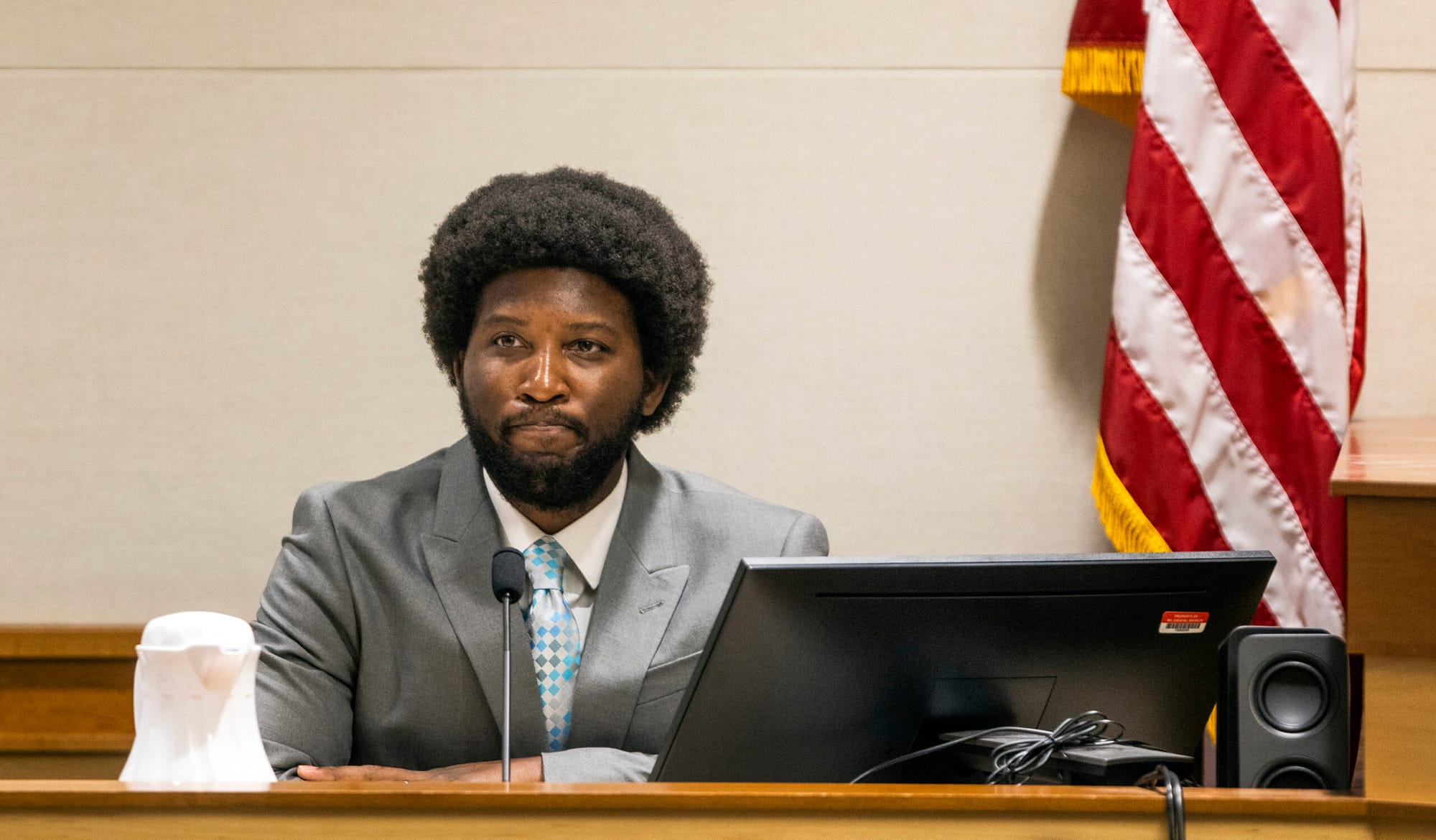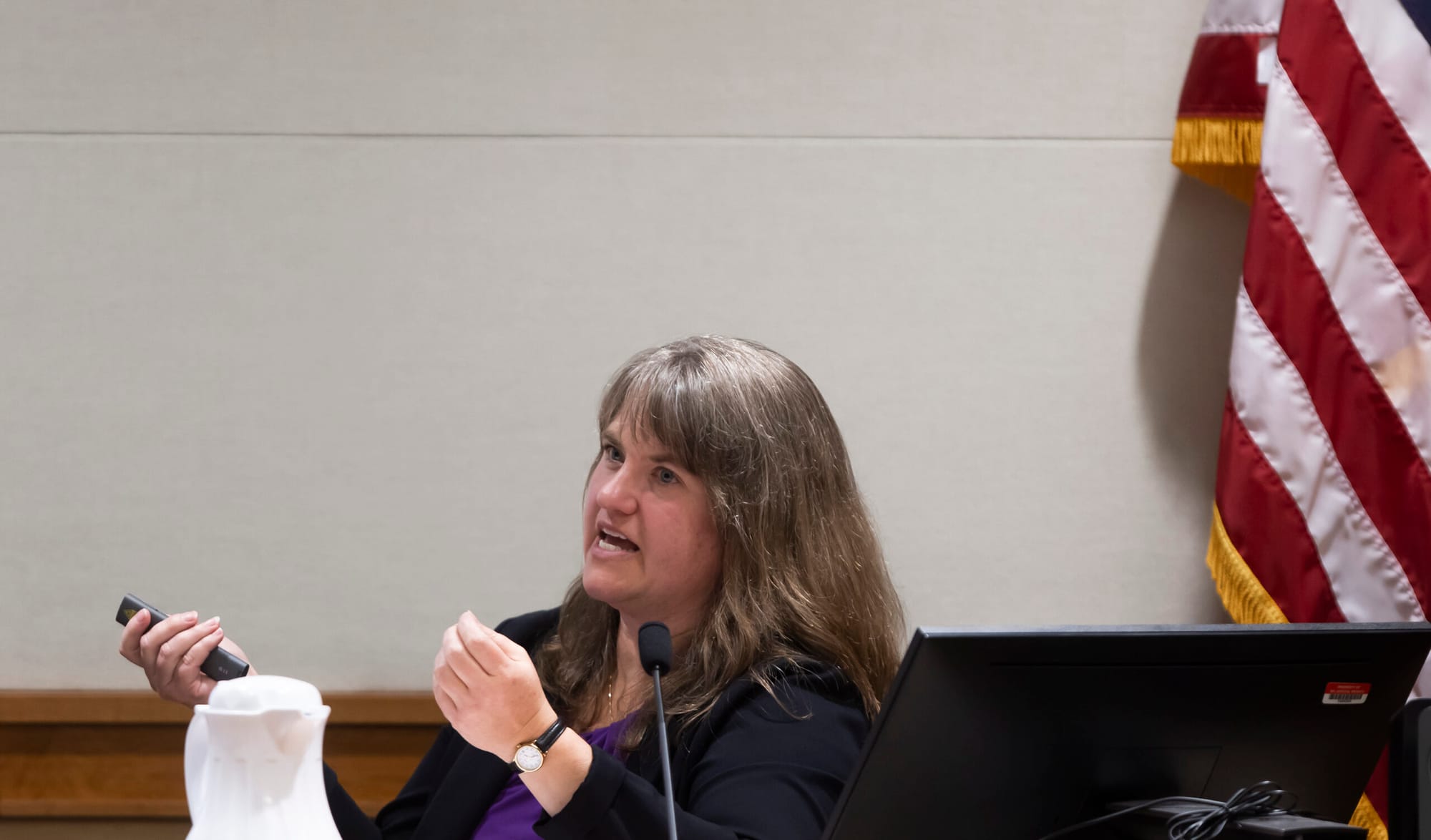DNA evidence, or lack of it, is focus as third week of Logan Clegg trial begins
Piece of evidence by piece of evidence, defense attorney Caroline Smith established that there was no blood or DNA evidence found on any of the items collected – at the scene of the shooting, a burned tent site nearby or six months later on Clegg’s person or among his belongings – that tied him to t

CONCORD, NH – State forensic lab experts testified Monday in Merrimack County Superior Court about blood and DNA testing on evidence collected after Djeswende and Stephen Reid were found shot to death in a wooded area of Concord in April 2022.
What wasn’t found, rather than what was, comprised much of the afternoon’s testimony as the third week of Logan Clegg’s trial on charges he killed the Reids got underway.
Piece of evidence by piece of evidence, defense attorney Caroline Smith established that there was no blood or DNA evidence found on any of the items collected – at the scene of the shooting, a burned tent site nearby or six months later on Clegg’s person or among his belongings – that tied him to the double shooting.
“The absence of evidence doesn’t prove anything?” Smith asked Bryant Kennedy, of the New Hampshire State Police Forensics Laboratory, after he said there was no blood found on a “severely worn” pair of boots found at Clegg’s Vermont tent site after his arrest. “You can’t prove [the boots] ever had blood?” she asked.
“Or that [they] didn’t,” Kennedy responded.
Both Kennedy and Katie Swango, of the state forensics lab, testified under cross-examination that in the case of the Reid homicides, they didn’t determine what items would be tested, but tested what was given them by investigators or the attorney general’s office.
Swango testified under direct questioning by Assistant Attorney General Meghan Hagaman that DNA from blood found on leaves woodland debris, a bullet fragment and the lid of a prescription pill bottle on Marsh Loop Trail matched that of Djeswende Reid.
Under cross-examination, Smith showed Swango two evidence envelopes that were also collected at the scene with a label that says they contain pine duff and leaves with “red blood stains,” but apparently hadn’t been tested.
Swango said she wasn’t asked to test the two pieces of evidence and has never looked in the evidence bags. “I don’t know what’s in those (evidence bags),” Swango said. “It could be anything in there.”
Smith asked Swango if a crime scene has blood in different places, is it possible that blood may be from different people?
Swango agreed that was possible.
“Your results don’t preclude” the possibility there was blood from someone else at the scene? Smith asked.
“My results are only for the portion I tested,” Swango said.
Kennedy, who took the stand before Swango, under direct testimony by Hagaman, described how, in general, he tests evidence for blood and other bodily fluids, like saliva, and any are present, sends the samples to the forensics lab’s DNA testing unit.
He also swabs for touch DNA, though Swango later testified that, while the New Hampshire lab takes swabs, it doesn’t have the capability to test for touch DNA. The swabs are sent to labs that can do that type of testing if a decision is made they should be tested. Touch DNA comes from someone touching an item and is usually more difficult to collect and test than DNA left by bodily fluids, Kennedy testified.
Hagaman asked Kennedy if bodily fluids are always found at a crime scene.
Kennedy responded that they’re not. He said that outdoor scenes “where something is exposed to the elements,” may have initially had bodily fluids that are no longer apparent or available to collect as evidence. The Reids are believed to have been shot on April 18, 2022, but their bodies were not found until the evening of April 21, 2022. They’d been dragged off Marsh Loop Trail in the Broken Ground Trail System in northeast Concord and covered with leaves and other woodland detritus. In between the shooting and when they were found there were periods of heavy rain.
Hagaman also asked about items Kennedy was given to test – a plastic Mountain Dew bottle, a coffee mug, a sock, multiple bullet casings, a bullet fragment and two bullets, among other items. Many of the items came from a spot in the woods where someone had burned a tent down with all the items inside. Kennedy testified that the items were charred or melted and he didn’t find any usable blood or saliva evidence on any of the items that had been in the fire.
“Where you surprised?” Hagaman asked.
He said that in general, he’s not surprised when he doesn’t find bodily fluids on evidence – it’s not unusual. When items are exposed to the elements, they’re less likely to have that type of evidence, he added.
Of the items that were burned, he said, “I wouldn’t expect to see a nice red-brown stain [blood] on something,” if it were charred.
Under cross-examination, he clarified to Smith that just because he didn’t find evidence of saliva on the Mountain Dew bottle or a coffee cup doesn’t mean it wasn’t there, just that it was not detectable.
Kennedy also testified that no blood evidence was found on the Glock 9mm pistol that Clegg had in his possession when he was arrested, or on any of his clothes, or his boots.
Under re-direct, Hagaman asked Kennedy how heat affects DNA from bodily fluids left on items. Kennedy said that “fire could damage DNA.” But under re-cross by Smith, he clarified that while it would damage DNA, it would not change a DNA profile if one were collected.
Smith also asked Kennedy if he looked for blood in the “nooks and crannies” of the gun, and if it were possible that there could be blood on a gun that would “blow back” from a shooting victim.
Kennedy said it was possible that could happen, but he found no blood on the gun. He also took two swabs for touch DNA each from the grip and the slide of the gun.
‘One of my best workers

Earlier Friday, Erica Collins, who had been Clegg’s supervisor at the Price Chopper supermarket, where he worked in Burlington from May to October 2022, said she cried when he gave his notice at the end of September 2022.
On very brief direct testimony under questioning by Assistant Attorney General Ryan Olberding, Collins said when Clegg gave his notice, he told her it was because he was going away. Collins said, “I pushed him further. ‘Is it Florida? Is it Texas?’” She said he finally told her, “Between you and I, it’s out of this country.”
On re-direct, Olberding asked her if Clegg specified what country that he was going to.
“No, he didn’t say,” Collins responded.
On cross-examination, defense attorney Mariana Dominguez asked Collins how she felt when Clegg gave his two-weeks notice.
“I was very upset,” she said. “I cried. I didn’t know what we were going to do. We were very short-staffed and he was one of my best workers.”
She said that Clegg was price accuracy coordinator, which means that his job was to make sure everything in the store was priced correctly.
Collins said that Clegg always wore the same thing – black pants, black boots.
Dominguez asked Collins about the boots that the staff had given Clegg as a going-away present because the ones he wore all the time were in rough shape.
“For the most part, Logan wore those same falling-apart black boots until just before he left?” Dominguez asked Collins, who responded “Yes.”
Clegg’s old boots were found in a garbage-strewn area near his tent site in Vermont after he was arrested.
At the start of Monday’s testimony, Dominguez continued cross-examination of Concord police officer Wade Brown over details of evidence found on Marsh Loop Trail and in Broken Ground Trail System in April and May 2022, having him fill in events on a calendar of the two months.
She also asked Brown details about an exercise he undertook to determine if someone could have dragged two bodies 50 yards off the trail in five minutes, the amount of time Nan Nutt, walking her dogs on the trail said elapsed between she heard gunshots and when she passed a man near the crime scene that police believe was Clegg.
Brown on May 10, 2022, dragged two weighted dummies from Marsh Loop Trail to where the bodies were found as a colleague timed him. Brown testified last week that it took him five minutes from the start until he “recovered his composure,” with the actual time it took to drag the dummies two minutes and 12 seconds.
Dominguez asked Brown about his fitness – he must pass a fitness test every three years. He is also a runner. He agreed that he’s in good shape.
She also asked Brown about his walk along the trail with Nutt after the Reids were found, parts of which he captured in “video snapshots” with his iPad. He did not have GPS turned on to get the coordinates, but later used data from Nutt’s Apple fitness app to determine where she was at certain times and points in the walk.
Dominguez asked if on that walk, Nutt indicated she saw the man at the spot police believe the Reids were shot. Brown said that no, it was beyond that point.
Dominguez also asked Brown about details of his conversation with Clegg in the South Burlington, Vermont, police station on Oct. 12, 2022. The first 13 minutes of the questioning hadn’t been recorded. Clegg’s responses in the hour that was recorded, played for the jury the Friday, were largely inaudible.
Brown testified he didn’t tell Clegg he wanted to talk to him about a New Hampshire double homicide until after Clegg was read his Miranda rights. That part of the conversation was before the recording began.
Brown said he brought up the Alton Woods apartment complex – where the Reids lived and near where they were killed – as well as the Marsh Loop Trail later, during the recorded section of the interview.
Brown also said that Clegg said he didn’t go to the Friendly Kitchen, a soup kitchen in Concord, because he believed they would ask for “government paperwork.”
Dominguez also asked Brown if he remembered Clegg saying he lived in a tent because rents were too high, and 80% of his pay would go to paying rent; that the reason he wanted to go to Europe was because he believed it would be cheaper to live there.
Brown either responded in the affirmative or said he didn’t recall to a series of questions Dominguez asked on the topic.
The day’s testimony ended with FBI agent Kevin Hoyland testifying, under direct examination by Hagaman, about cell phone data from both Stephen Reid and Logan Clegg’s phone. Hoyland will continue his testimony when court is back in session at 9 a.m. Tuesday.
The trial is scheduled to end Friday. Clegg is charged with two counts of second-degree murder for “knowingly causing the death” of each of the Reids, two alternative second-degree murder charges for “recklessly causing” their deaths, three counts of falsifying physical evidence and one count of being a convicted felon in possession of a firearm and one count of falsifying physical evidence (a Class B felony) was added. He’s been held in Merrimack County Jail.





